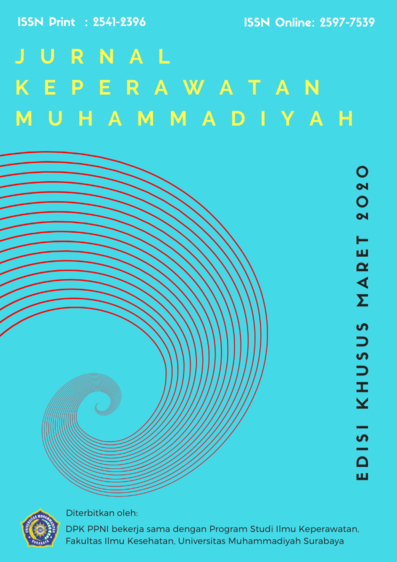Gambaran pemberian ASI esklusif dan susu formula terhadap kejadian obesitas balita di salatiga
DOI:
https://doi.org/10.30651/jkm.v5i2.4240Keywords:
Exclusive ASI Breastfeeding, Giving Formula Milk, Obesity, ToddlersAbstract
Background: National coverage of exclusive breastfeeding in infants 0-6 months, foods that are often given when a newborn baby, such as formula milk, honey, and water which includes non-formula milk, honey, sugar water, bananas smooth, the sweet, and fine bubu. These foods are called prelacteal foods, these foods can be very dangerous if given too early to babies because these foods do not contain enzymes so that absorption in food will always depend on the enzymes found in the baby's milk (Ministry of Health Republic of Indonesia 2015). On Government Regulation Number 33 In 2012 every Indonesian citizen with a healthy condition, is required to give exclusive breastfeeding to her baby since she was born for six months without adding and or replacing with other food and drinks. The aim is to describe breastfeeding and formula milk in the incidence of obesity in children under five in Salatiga. Method In this research the research method used is quantitative (descriptive) research method which will be carried out in August - October 2019. Population is a group of elements or elements that can be in the form of humans or individuals, animals, plants, institutions or institutions, groups , documents, events, things, symptoms, or concepts that form the object of research, the population in this study are mothers who have obese toddlers in Salatiga. Discussion: Based on the results above, most respondents understood that breastfeeding for infants was an important thing to do, mainly through the socialization of exclusive breastfeeding programs delivered by nutrition workers and cadres in local health services, both at the Puskesmas and Posyandu. Mothers and families are always reminded by nutrition workers and cadres to routinely breastfeed babies and infants, especially exclusive breastfeeding at least until the age of 6 months. The respondents said that exclusive breastfeeding continued until the age of 6 months, then continued with formula feeding. Breastfeeding for the first time plays a role in the provision of nutrition that begins at the time of gestation and eating behavior begins to be conditioned and trained early in life (Afifatun, 2014).ÂReferences
Afifatun Insiyah, Kejadian Obesitas Pada Balita 1-5 Tahun Di Bps Ny Lilik M. Amd.Keb Desa Sreseh Kecamatan Sreseh Kabupaten Sampang, 12 Juni 2014
Ariani. Ibu Susui Aku. Cetakan I. Bandung:Khazanah Intelektual, 2009;
Ermy Liesma Saputri, Ahmad Syauqy, Hubungan Riwayat Pemberian Asi Eksklusif Dengan Kejadian Obesitas Pada Anak, Journal of Nutrition College, Volume 3, Nomor 1, Tahun 2014, Halaman 1 – 8
Fitria Ika Wulandari, Natalia Riski Iriana, KARAKTERISTIK IBU MENYUSUI YANG TIDAK MEMBERIKAN ASI EKSKLUSIF DI UPT PUSKESMAS BANYUDONO I KABUPATEN BOYOLALI. INFOKES, VOL. 3 NO. 2 Agustus 2013
http://download.portalgaruda.org/article.php?article=150703&val=4925
http://www.depkes.go.id/resources/download/pusdatin/profil-kesehatan indonesia/profilkesehatan-Indonesia-2015.pdf
Kemenkes RI. Pusat Data dan Informasi 2015: Situasi dan Analisis ASI Eksklusif.
Levin and Patterson* News & View. Exercising the obese brain: Resetting the defended body weight. Endocrinology 2005;146:1674-1675.
Notoatmodjo. Metodologi Penelitian Kesehatan. Jakarta: Rineka Cipta; 2010
Peraturan Pemerintah No. 33 Tahun 2012 tentang Pemberian Air Susu Ibu (ASI) Eksklusif
Pudjiadi,S.Ilmu Gizi Klinis pada Anak. Jakarta: FKUI, 2002;
Rafika O. Analisis Faktor yang Berhubungan dengan Pemberian Susu Formulapada Bayi 0-6 Bulan. Jurnal Kesehatan, Volume VIII, Nomor 3 hlm 315, 2017;
Riskesdas. Prevalensi Ispa Berdasarkan Diagnosis Nakes* dan Gejala Menurut Provinsi, 2013 - 2018. 2018;26.
Sari F. factor-faktor yang berhubungan dengan terjadinya obesitas pada anak TK YPI Ibnu Syam, cempaka putih dan waladum Shale Kecamatan Banuhampu Kabupaten Agam Tahun 2011. Skripsi. Padang; Universitas Andalas. 2011
Triastuti & anasari. Hubungan Pemberian Susu Formula Dengan Obesitas Pada Anak Usia 5-6 Tahun Di Pendikan Anak Usia Dini Kecamatan Mandiraja Kabupaten Banjarnegara. 2013
WHO. Infans exclusively breastfed for the first 6 months of life. Retrieved October 24, 2017, from http://www.who.int/en, (2011);
Downloads
Published
Issue
Section
License
- Penulis tetap memegang hak atas karyanya dan memberikan hak publikasi pertama kepada jurnal ini yang secara simultan karya tersebut dilisensikan di bawah:Â Creative Commons Attribution-ShareAlike 4.0 International (CC BY-SA 4.0)













